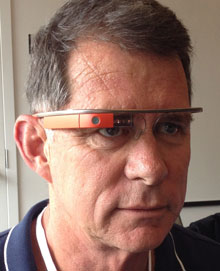
The future of marketing is here, right now, today and it’s being played out daily in Google’s offices in San Francisco, says BrandWorld managing director Richard Stevens.
Stevens and his BrandWorld colleague Mike O’Sullivan, are bubbling over with enthusiasm for the future of marketing and the potential of new technologies having recently returned from an invite-only trip to visit Google and its sister company YouTube’s headquarters in San Francisco.
Calling the invite a bucket-list honour, Stevens says the trip was awe-inspiring and the implications of what Google is doing for today’s marketers is enormous.
“You have to get your head around the fact that in comparison to what they will be tomorrow, today’s smart phones are really as crude as two tin cans connected by a vibrating piece of string. The way we distribute information and receive information will become completely intuitive. Big data is going to change and is changing everything we know about marketing today.”
BrandWorld is the first Kiwi advertising or marketing consultancy to have been invited to attend a Google Executive Summit; an honour usually reserved for the CEOs and CMOs of New Zealand’s larger companies.
But given Google’s need for and BrandWorld’s focus on branded content (also known as content marketing) perhaps it’s not that surprising, says O’Sullivan. BrandWorld produces several of its own branded content programmes, including Family Health Diary, Discover and the rurally-focused Field Trials, as well as bespoke offerings such as Wattie’s Food in a Minute, Fonterra’s Nourish and Lion’s Made to Match and The Mix.
Along with their fellow invitees, O’Sullivan and Stevens were treated to a two-day in-depth look at everything Google and YouTube are up to and how that will affect marketers and content providers alike.
They experienced Google Glass, the wearable technology with an optical head-mounted display that displays information as you ask for it or as you interact with the world around you; nosed around driverless cars – the mobile office of tomorrow, which could mean the end of car insurance and panel beaters and a sizeable drop in hospital admissions; gasped at the potential of Project Iris, where smart contact lenses are being trialled to monitor glucose levels in diabetics; and were wowed by the potential power of Project Loon, Google’s endeavour to bring the internet to the whole world through a wireless network of balloons.
But the truly big global change that is beginning to affect all our lives today is data, says Stevens. “Big data is already beginning to shape our lives, both in the way marketing is heading and in how returns are measured.
“It’s the age of the Math Men. Mad Men, the advertising style of the past, will be just that, confined to the past. Big data will transform everything we do. It’s happening now. None of this is science fiction. Everything and anything we do is being analysed to enable the smartphones, tablets or Google glasses of the future to be completely intuitive; predicting your next behaviour before you do it. The implications for marketers and companies such as ourselves are enormous.”
Though much of the content BrandWorld produces today is already repurposed for a number of different technologies, platforms and audiences, says O’Sullivan, this repurposing is going to increase ten-fold, allowing marketers and their partners, consultancies like BrandWorld, to influence every part of a consumer’s pathway to purchase.
“It will allow one-to-one messaging in real time. It’s incredibly exciting,” says O’Sullivan. “Marketers will actually have to turn their whole marketing department into a content – an individualised-content model – creating content for each customer or potential customer as if they are a personal friend, not just some demographic as they do now.
“We don’t have to understand it all; we just have to embrace it all. Google’s not in the content creation business, that’s our job. Google’s just in the business of developing all the tools that allow us to do it and deliver it better.”
Ten things Google know to be true
- Focus on the user and all else will follow
- It’s best to do one thing really, really well
- Fast is better than slow
- Democracy on the web works
- You don’t need to be at your desk to need an answer
- You can make money without doing evil
- There’s always more information out there
- The need for information crosses all borders
- You can be serious without a suit
- Great just isn’t good enough
- For more on Google’s philosophy click here.
Share this Post


